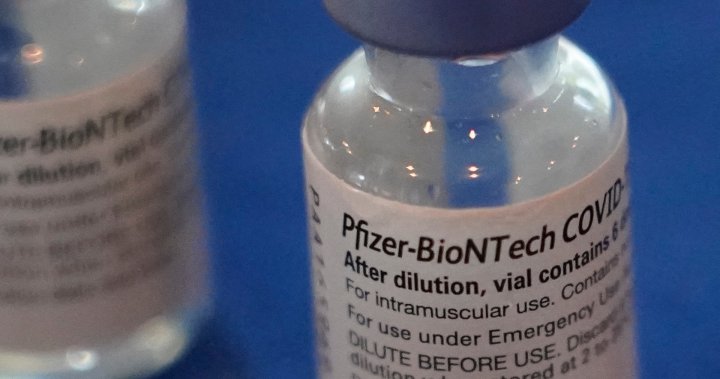Longer gaps between mRNA vaccine doses give stronger immune response: Canadian study | Globalnews.ca
A new Canadian study has found that delaying the second dose of an mRNA vaccine for COVID-19 creates a stronger immune response than two doses delivered closer together.
The peer-reviewed study compared blood test results from 186 paramedics across the country, 118 of whom were double-vaccinated with less than four weeks between doses, and 68 of whom waited between six and seven weeks for a second shot.
Regardless of which mRNA vaccine was used — Pfizer-BioNTech’s Comirnaty, Moderna’s Spikevax or a combination of both — those who waited longer had higher antibody concentrations.
Read more:
B.C. to reduce interval between COVID-19 vaccine doses to four weeks
Antibodies are proteins produced by the immune system that flow through the blood, recognize foreign substances like bacteria and viruses, and neutralize them.
“I think for people who are not vaccinated yet, this is very important,” said Dr. Brian Grunau, the study’s principal investigator, in an interview.
“We believe that the immune response that is generated from a vaccine — a strong response will likely be able to better fight a COVID infection.”

The study, funded by the federal government’s COVID-19 Immunity Task Force, was published Tuesday in the journal Clinical Infectious Diseases. Its findings, however, were analyzed in July and shared with the task force and other public health decision-makers.
It’s the first peer-reviewed study in North America examining the timing between the first and second doses of mRNA vaccines, according to a news release from the University of British Columbia, where Grunau teaches emergency medicine.
He said the findings are also important for countries that have not had stable access to vaccines — delayed intervals not only mean more antibodies, he explained, but more time to get more people vaccinated.
The study did not assess “breakthrough” infections of COVID-19 — infections that come after full immunization.
Read more:
Longer gap between Pfizer COVID-19 vaccine shots boosts antibodies higher, study finds
Vaccine intervals have varied in immunization programs across Canada as new data emerged, and factors like outbreaks and patient vulnerability impact the need to get people double-vaccinated quickly.
In August, for example, the B.C. government reduced the interval between vaccine doses from seven weeks to four weeks for about 170,000 people living in virus outbreak zones.
The National Advisory Council on Immunization (NACI) recommends waiting eight weeks between doses, but lists four weeks as the acceptable minimum.

Other studies have also found that increased intervals between mRNA vaccine doses can produce stronger immune responses.
A British study of 503 health-care workers who received two shots of the Comirnaty vaccine had similar findings — neutralizing antibody levels were twice as high after a longer dosing interval. Its findings were published in July — about the same time Grunau and his colleagues were analyzing their data.
Britain has reduced its own recommended interval from 12 weeks to eight weeks.
Read more:
COVID-19 virus found in 3 Quebec deer, Canadian officials say
While the findings for many studies take months to reach the public, Grunau explained, governments and public health officials have received “sneak peaks” during the pandemic in order to allow them to make good policy decisions.
Research has even allowed NACI to move away from the mRNA manufacturers’ recommendations of waiting between 17 to 28 days between doses, to a recommended 56 days.

“It’s a really interesting place to be,” said Grunau, who is also a scientist at the Centre for Health Evaluation and Outcome Sciences.
“No time in my career has the funding and research, and translation of new research findings into policy and medical practice been so quick.”
Since the pandemic began, the COVID-19 Immunity Task Force has supported over 100 studies across Canada.
View link »
© 2021 Global News, a division of Corus Entertainment Inc.
For all the latest health News Click Here




